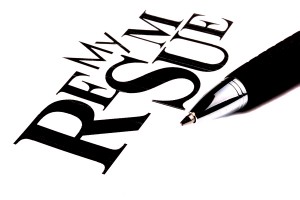By Bruce Alexander
As a business owner, I read a significant amount of cover letters and resumes. I really don’t mind because I find it interesting to read about what people have done (more accurately, claim they have done). Regrettably I’ve noticed a propensity in certain professions that draw heavily from military, former military, law enforcement, security, firefighters etc…to write resumes that are simply non-responsive to the requirements.
This is really unfortunate because I believe that otherwise capable individuals are missing great opportunities merely because they can’t write a decent resume that has a better than average chance of being read. If most of these resume writers could make a few simple tweaks to their resume, I think their prospects might be significantly increased.
So here are some tips that I have learned overtime from reviewing thousands of resumes to help you write the good executive protection resume:
• What Can You Do For Me? There is a enormous difference between what you’ve done and what you can do for me (the employer). Are you sending me your work history or depicting what value you can bring to my organization?
Can you solve my problems? This is probably the biggest point missed by most applicants. I don’t care what you did for someone else. What can you do for me? Answer this question with everything you put on a resume.
• You need more than one resume. A Good Resume should be written to respond to specific requirements. Do the work and develop more than one resume. There is no one size fits all when it comes to resumes.
• Less is more. Employers have a limited amount of time.
A longer resume is not a better resume. Usually it means the candidate is trying for anything and everything and winds up with nothing. Focus, focus, focus. A two page resume is the limit. Use your cover letter to add additional information.
This is another reason why you need more than one resume. You can’t send the same resume to every possible employer. Read the position requirements. If it says a Curriculum Vitae (CV) is acceptable send a CV but you better know what goes into a CV.
• Write to the position. Space is limited. If the position calls for “X” don’t put “A,B and C.” The employer is trying to tell you something. They are looking for a certain profile. Respond to that profile.
• No personal stuff. Leave your marital status, hobbies, community service, etc…off your resume. It doesn’t add value and might hurt you. The only exception is when your hobby supports the position but then again, that belongs in the resume body.
• Awards and decorations. Everyone is proud of what they have accomplished but guess what, unless the position has a specific requirement for something you have been decorated for, it’s extra baggage. If the award or decoration is not related to the position, leave it off.
• Professional appearance counts even in your resume. Spend the extra money to get some decent resume paper. It will help you standout.
• Think about what image you are conveying. Let me illustrate this point by sharing this tidbit. A colleague once applied for a position listing his personal e-mail address as part of his contact information. His e-mail address began with “chainsaw.”. Then he wondered why he wasn’t receiving a response to his resume. Enough said.
• No pictures please. Unless you are applying for a job as a TV reporter, forget about it. Pictures hurt more than they help. If the announcement requires a picture, get a conservative one.
• Spell-check. Spell-check your resume. What you put into your resume is what you will get out of it. Employers are busy people. The reality is unless you capture the reader’s attention in the first few lines, your chances of being considered drop significantly regardless of your qualifications.
Take the time and effort to write a responsive, well-crafted resume. You’ll significantly increase your opportunities by doing so.


Great article.
Thank you,
Mary S.
Will you take a look at my resmue and help restructure it. I fell it is very week, Thanks
Bruce: Very well-written and informative. As you pointed out, the resumes that always catch my eye are the ones that say “What can you do for me”, great advise!
Article is a great reminder to be diligent about my personal resume, and how its written. Thank you.
SuBmission. Vertical file for this comment!
This was EXCELLENT. I’ve seen my share of resumes too, and wholeheartedly agree. Too few people realize that a submission is more about the position and the employer’s need than about themselves. And serious, motivated, detail-oriented candidates, you know, of the kind that get hired to protect people, don’t send resumes filled with with bad grammar and misspellings or typos. This really sends the wrong message and the subission to the trash can.